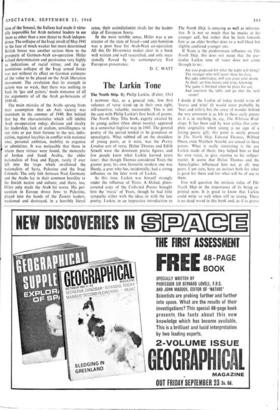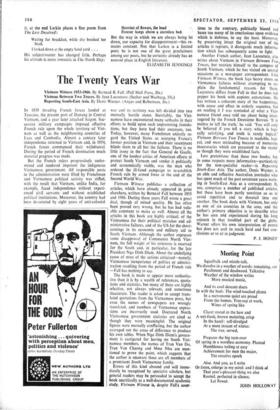The Larkin Tone
The North Ship. By Philip Larkin. (Faber, 15s.)
I SUPPOSE that, as a general rule, few first volumes of verse stand up in their own right, self-assertive, valuable, memorable. This is not the case with Philip Larkin's first book of poems, The North Ship. This book, eagerly awaited by its young author (then about twenty), appeared in a somewhat fugitive way in 1945. The general poetry of the period tended to be grandiose or apocalyptic. What rubbed off on the shoulders of young poets, as it were, was the Poetry London sort of verse. Dylan Thomas and Edith Sitwell were the dominant poetic figures, and few people knew what Larkin learned years later: that though Thomas considered Yeats the greater poet, his own favourite modern one was Hardy, a poet who has, incidentally, had a strong influence on the later work of Larkin.
At this time, Larkin was himself strongly under the influence of Yeats. A filched, plum- covered copy of the Collected Poems brought him the 'music' of Yeats, though he had little sympathy either with the ideas or with the late poetry. Larkin, in an impressive introduction to The North Ship, is amusing as well as informa- tive. It is not so much that he mocks at his younger self, but rather that he feels towards him as an older brother does to a well-liked but slightly confused younger one.
If Yeats is the predominant influence on The North Ship, this does not mean that the par- ticular Larkin tone of voice does not come through to us:
Are you prepared for what the night will bring? The stranger who will never show his face, But asks admittance; will you greet your doom As final; set him loaves and wine; knowing The game is finished when he plays his ace, And overturn the table and go into the next room?
I doubt if the Larkin of today would write of 'loaves and wine' (it would more probably be 'beer and rolls'), but the sense of wonder behind the wry comment is as felt in these early poems as it is in anything in, say, The Whitsun Wed- dings. It has been said by wise critics that com- plete originality when young is no sign of a lasting poetic gift; this point is surely proved in The North Ship. Edward Thomas, Wilfred Owen, even Matthew Arnold, are sensed in these poems. What is really interesting is the use Larkin made of them; they helped him to find his own voice, to give stamina to his subject- matter. It seems that Dylan Thomas and the Apocalyptics influenced him not at all; true poets, I am sure, have an instinct both for what is good for them and for what will be of use to them.
Few will question the intrinsic value of The North Ship or the importance of its being re- printed now. It is good to know that Larkin could write so well when still so young. There is no dead wood in this book and, as if to prove it, at the end Larkin places a fine poem from The Less Deceived: Waiting for breakfast, while she brushed her head, I looked down at the empty hotel yard . . .
His subject-matter has changed little. Perhaps his attitude is more romantic in The North Ship: Heaviest of flowers, the bead Forever hangs above a stormless bed.
But the way in which we are always being let down, our capacity for disappointment—this re- mains constant. Not that Larkin is a limited poet; he is not one of the great proclaimers among our poets, but he certainly already has an assured place in English literature.
•
ELIZABETH JENNINGS



































 Previous page
Previous page